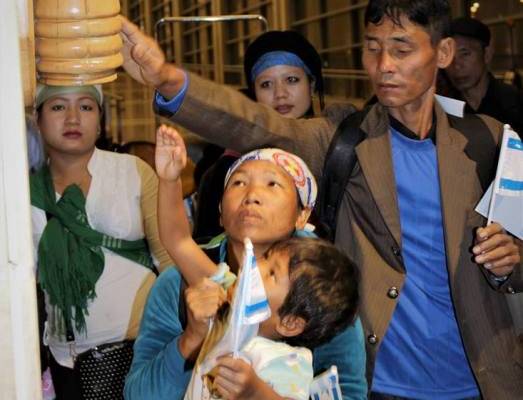231 Jews from around the world have arrived in Israel to call it their home.
Ending a 2,700 year old exile, 162 members from the Bnei Menashe Jewish community of northeast India arrived in Israel last week, marking the latest wave of so-called “lost” Jews to immigrate to the Jewish state.
The new immigrants arrived at Israel’s Ben Gurion Airport in two groups and were greeted by jubilant family members and supporters, who danced, sang and waved Israeli flags.
The latest Aliyah [immigration to Israel] of Bnei Menashe members follows a group of 102 Indian Jews who arrived in Israel in February.
Members of the Bnei Menashe community descend from Jews banished from ancient Israel to India in the 8th century BCE.
Their immigration is organized by Shavei Israel, a Jerusalem-based nonprofit that calls itself “the only Jewish organization today that is actively reaching out to ‘lost Jews’ in an effort to facilitate their return [to Israel].” The groups leader Michael Freund told United with Israel that the newcomers will temporarily be housed at the Shavei Israel absorption center in Kfar Hasidim near Haifa, and after about three months they will be permanently settled in Tiberias. “The government has already given us permission to bring another 500 Bnei Menashe to Israel in 2018,” said Freund.
In 2005, then-Sephardic Chief Rabbi of Israel Shlomo Amar officially recognized the Bnei Menashe as a “lost” tribe. Since then, some 3,000 Bnei Menashe have made Aliyah, and 7,000 remain in India. Those seeking more information about the Bnei Menashe can visit the Shavei Israel website: www.shavei.org.
In a separate development,, a group of 69 Ethiopian Falash Mura Jews arrived in the Jewish state Thursday to reunite with family members and make new lives in the country.
Falash Mura is the name given to those of the Beta Israel community in Ethiopia and Eritrea who converted to Christianity under pressure from the Christian Mission during the 19th and 20th centuries. The establishment of the Jewish state and the waves of aliyah from Ethiopia have brought them back to their roots and heritage.
In 2003, the Israeli government applied Resolution 2958 to the Falash Mura, which grants maternal descendants of Jews the right to immigrate to Israel under the Israeli Law of Return and to obtain citizenship if they convert to Judaism.
Some 9,000 Falash Mura still reside in Ethiopia and are awaiting Israeli government approval to make Aliyah.
By: JNS.org and United with Israel Staff










